Bestgrades
We provide our customers with the highest quality documents to help them prepare for their exams. Our revision and past exams documents are comprehensive and cover a wide range of topics, so you can be sure that you are getting the best preparation material available. We also offer a variety of study aids and resources to help you get the most out of your studying experience. Our team of experienced experts is dedicated to helping you succeed, and our commitment to providing the best materials and resources makes us the go-to source for students seeking to excel in their upcoming exams.
- 1149
- 2
- 10
Community
- Followers
- Following
53 Reviews received
1160 items
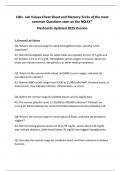
100+ Lab Values Cheat Sheet and Memory Tricks of the most common Questions seen on the NCLEX® Flashcards Updated 2025 Version.
1. General Lab Values Q1: What is the normal range for serum sodium levels? A) 135-145 mEq/L B) 3.5-5.0 mEq/L C) 70-100 mg/dL D) 8.5-10.5 mg/dL Answer: A) 135-145 mEq/L Elaboration: Serum sodium levels are crucial for maintaining fluid balance and nerve function. Values outside this range can indicate dehydration, kidney issues, or other medical conditions. 2. Electrolytes Q2: Which electrolyte is primarily responsible for maintaining cardiac rhythm? A) Calcium B) Sodium C) Potas...
- Package deal
- Exam (elaborations)
- • 19 pages •
1. General Lab Values Q1: What is the normal range for serum sodium levels? A) 135-145 mEq/L B) 3.5-5.0 mEq/L C) 70-100 mg/dL D) 8.5-10.5 mg/dL Answer: A) 135-145 mEq/L Elaboration: Serum sodium levels are crucial for maintaining fluid balance and nerve function. Values outside this range can indicate dehydration, kidney issues, or other medical conditions. 2. Electrolytes Q2: Which electrolyte is primarily responsible for maintaining cardiac rhythm? A) Calcium B) Sodium C) Potas...
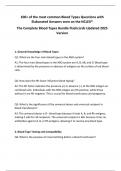
100+ of the most common Blood Types Questions with Elaborated Answers seen on the NCLEX® The Complete Blood Types Bundle Flashcards Updated 2025 Version.
1. General Knowledge of Blood Types Q1: Which blood type is considered the universal donor? A) A B) B C) AB D) O Answer: D) O Elaboration: Blood type O is known as the universal donor because it lacks A and B antigens, making it safe for transfusion to any blood type. Individuals with type O blood can donate to anyone, but they can only receive type O blood. 2. Blood Type Testing and Compatibility Q2: What is the primary purpose of the crossmatch test before a blood transfusion? A)...
- Package deal
- Exam (elaborations)
- • 15 pages •
1. General Knowledge of Blood Types Q1: Which blood type is considered the universal donor? A) A B) B C) AB D) O Answer: D) O Elaboration: Blood type O is known as the universal donor because it lacks A and B antigens, making it safe for transfusion to any blood type. Individuals with type O blood can donate to anyone, but they can only receive type O blood. 2. Blood Type Testing and Compatibility Q2: What is the primary purpose of the crossmatch test before a blood transfusion? A)...
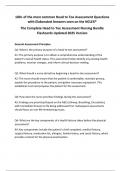
100+ of the most common Head to Toe Assessment Questions with Elaborated Answers seen on the NCLEX® The Complete Head to Toe Assessment Nursing Bundle Flashcards Updated 2025 Version.
General Assessment Principles Q1: What is the primary purpose of performing a comprehensive health assessment? A) To diagnose diseases B) To establish a baseline for future assessments C) To prescribe medications D) To determine the patient's financial status Answer: B) To establish a baseline for future assessments Elaboration: A comprehensive health assessment helps to gather baseline data about the patient’s health status, which is essential for comparison in future assessments an...
- Package deal
- Exam (elaborations)
- • 19 pages •
General Assessment Principles Q1: What is the primary purpose of performing a comprehensive health assessment? A) To diagnose diseases B) To establish a baseline for future assessments C) To prescribe medications D) To determine the patient's financial status Answer: B) To establish a baseline for future assessments Elaboration: A comprehensive health assessment helps to gather baseline data about the patient’s health status, which is essential for comparison in future assessments an...
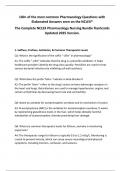
100+ of the most common Pharmacology Questions with Elaborated Answers seen on the NCLEX® The Complete NCLEX Pharmacology Nursing Bundle Flashcards Updated 2025 Version.
Suffixes, Prefixes, Antidotes, & Common Therapeutic Levels Q1: Which of the following suffixes indicates that a drug is a beta-blocker? A) -pril B) -olol C) -statin D) -cillin Answer: B) -olol Elaboration: The suffix “-olol” is commonly used for beta-blockers, which are medications that block beta-adrenergic receptors, leading to decreased heart rate and blood pressure. Pain Management Drugs (NSAIDs, Opioid Analgesics) Q2: Which medication is classified as a nonsteroidal anti-in...
- Package deal
- Exam (elaborations)
- • 24 pages •
Suffixes, Prefixes, Antidotes, & Common Therapeutic Levels Q1: Which of the following suffixes indicates that a drug is a beta-blocker? A) -pril B) -olol C) -statin D) -cillin Answer: B) -olol Elaboration: The suffix “-olol” is commonly used for beta-blockers, which are medications that block beta-adrenergic receptors, leading to decreased heart rate and blood pressure. Pain Management Drugs (NSAIDs, Opioid Analgesics) Q2: Which medication is classified as a nonsteroidal anti-in...
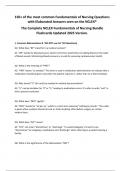
150+ of the most common Fundamentals of Nursing Questions with Elaborated Answers seen on the NCLEX® The Complete NCLEX Fundamentals of Nursing Bundle Flashcards Updated 2025 Version.
Common Abbreviations & "DO NOT use list" Q1: What does the abbreviation "NPO" stand for? A) Nothing by mouth B) Nutrition provided orally C) No past orders D) Normal patient output Answer: A) Nothing by mouth Elaboration: NPO is a medical abbreviation meaning the patient should not take anything by mouth, often used before surgery or certain medical procedures. Priority Questions Q2: In a triage situation, which patient should the nurse assess first? A) A patient with a spraine...
- Package deal
- Exam (elaborations)
- • 29 pages •
Common Abbreviations & "DO NOT use list" Q1: What does the abbreviation "NPO" stand for? A) Nothing by mouth B) Nutrition provided orally C) No past orders D) Normal patient output Answer: A) Nothing by mouth Elaboration: NPO is a medical abbreviation meaning the patient should not take anything by mouth, often used before surgery or certain medical procedures. Priority Questions Q2: In a triage situation, which patient should the nurse assess first? A) A patient with a spraine...
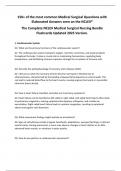
150+ of the most common Medical Surgical Questions with Elaborated Answers seen on the NCLEX® The Complete NCLEX Medical Surgical Nursing Bundle Flashcards Updated 2025 Version.
Endocrine Q1: Which hormone is primarily responsible for regulating blood glucose levels? A) Insulin B) Cortisol C) Thyroxine D) Glucagon Answer: A) Insulin Elaboration: Insulin, produced by the pancreas, lowers blood glucose levels by facilitating the uptake of glucose into the body's cells. In diabetes, this regulation is impaired. Diabetes Type 1 & 2 Q2: A patient with Type 2 diabetes is prescribed Metformin. What is the primary action of this medication? A) Increases insulin p...
- Package deal
- Exam (elaborations)
- • 34 pages •
Endocrine Q1: Which hormone is primarily responsible for regulating blood glucose levels? A) Insulin B) Cortisol C) Thyroxine D) Glucagon Answer: A) Insulin Elaboration: Insulin, produced by the pancreas, lowers blood glucose levels by facilitating the uptake of glucose into the body's cells. In diabetes, this regulation is impaired. Diabetes Type 1 & 2 Q2: A patient with Type 2 diabetes is prescribed Metformin. What is the primary action of this medication? A) Increases insulin p...
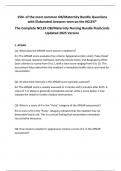
150+ of the most common OB.Maternity Bundle Questions with Elaborated Answers seen on the NCLEX® The Complete NCLEX OB.Maternity Nursing Bundle Flashcards Updated 2025 Version.
1. APGAR Q1: What does the "P" in the APGAR score stand for? A) Pulse B) Pressure C) Position D) Prolapse Answer: A) Pulse Elaboration: The APGAR score evaluates five criteria (Appearance, Pulse, Grimace, Activity, and Respiration) to assess the health of a newborn at one and five minutes after birth. The "P" specifically refers to the heart rate (pulse). 2. Acronyms Q2: What does the acronym "LMP" stand for in obstetric terms? A) Last Menstrual Period B) Labor Management Pl...
- Package deal
- Exam (elaborations)
- • 34 pages •
1. APGAR Q1: What does the "P" in the APGAR score stand for? A) Pulse B) Pressure C) Position D) Prolapse Answer: A) Pulse Elaboration: The APGAR score evaluates five criteria (Appearance, Pulse, Grimace, Activity, and Respiration) to assess the health of a newborn at one and five minutes after birth. The "P" specifically refers to the heart rate (pulse). 2. Acronyms Q2: What does the acronym "LMP" stand for in obstetric terms? A) Last Menstrual Period B) Labor Management Pl...
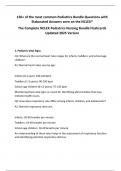
150+ of the most common Pediatrics Bundle Questions with Elaborated Answers seen on the NCLEX® The Complete NCLEX Pediatrics Nursing Bundle Flashcards Updated 2025 Version.
1. Pediatric Vital Signs Q1: What is the normal range for a resting heart rate in a 2-year-old child? A) 60-100 bpm B) 80-120 bpm C) 100-140 bpm D) 120-160 bpm Answer: B) 80-120 bpm Elaboration: The normal resting heart rate for toddlers (1-3 years) is typically between 80 and 120 beats per minute. 2. Piaget's Stages of Cognitive Development Q2: At what stage of Piaget's cognitive development do children begin to think logically about concrete events? A) Sensorimotor B) Preopera...
- Package deal
- Exam (elaborations)
- • 60 pages •
1. Pediatric Vital Signs Q1: What is the normal range for a resting heart rate in a 2-year-old child? A) 60-100 bpm B) 80-120 bpm C) 100-140 bpm D) 120-160 bpm Answer: B) 80-120 bpm Elaboration: The normal resting heart rate for toddlers (1-3 years) is typically between 80 and 120 beats per minute. 2. Piaget's Stages of Cognitive Development Q2: At what stage of Piaget's cognitive development do children begin to think logically about concrete events? A) Sensorimotor B) Preopera...
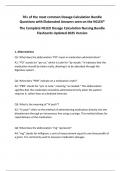
70+ of the most common Dosage Calculation Bundle Questions with Elaborated Answers seen on the NCLEX® The Complete NCLEX Dosage Calculation Nursing Bundle Flashcards Updated 2025 Version
1. Abbreviations Q1: What does the abbreviation "IM" stand for in medication administration? A) Intramuscular B) Intravenous C) Intraosseous D) Inhalation Answer: A) Intramuscular Elaboration: "IM" refers to the intramuscular route of administration, where medication is injected directly into a muscle. 2. Conversion Overview (Volume & Weight) Q2: How many milliliters are in 0.5 liters? A) 50 mL B) 100 mL C) 500 mL D) 1000 mL Answer: C) 500 mL Elaboration: There are 1000 ...
- Package deal
- Exam (elaborations)
- • 26 pages •
1. Abbreviations Q1: What does the abbreviation "IM" stand for in medication administration? A) Intramuscular B) Intravenous C) Intraosseous D) Inhalation Answer: A) Intramuscular Elaboration: "IM" refers to the intramuscular route of administration, where medication is injected directly into a muscle. 2. Conversion Overview (Volume & Weight) Q2: How many milliliters are in 0.5 liters? A) 50 mL B) 100 mL C) 500 mL D) 1000 mL Answer: C) 500 mL Elaboration: There are 1000 ...
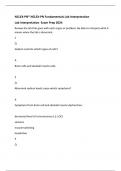
NCLEX-PN® NCLEX-PN Fundamentals Lab Interpretation Lab Interpretation Exam Prep 2024
Sodium controls which types of cells? A Brain cells and skeletal muscle cells. 2 Q Abnormal sodium levels cause which symptoms? A Symptoms from brain cell and skeletal muscle dysfunction: decreased level of consciousness (↓ LOC) seizures muscle twitching headaches 3 Q Potassium controls which types of cells? A Heart and skeletal muscle cells. 4 Q Abnormal potassium levels cause which symptoms? A Symptoms from heart and skeletal muscle dysfunction: heart dy...
- Exam (elaborations)
- • 10 pages •
Sodium controls which types of cells? A Brain cells and skeletal muscle cells. 2 Q Abnormal sodium levels cause which symptoms? A Symptoms from brain cell and skeletal muscle dysfunction: decreased level of consciousness (↓ LOC) seizures muscle twitching headaches 3 Q Potassium controls which types of cells? A Heart and skeletal muscle cells. 4 Q Abnormal potassium levels cause which symptoms? A Symptoms from heart and skeletal muscle dysfunction: heart dy...

Test Bank For Brunner & Suddarth's Textbook of Medical-Surgical Nursing 15th Edition Author(s) Janice L Hinkle, Kerry H. Cheever All Chapters
Test Bank for Principles of Pediatric Nursing: Caring for Children, 7th Edition. Jane W Ball. Ruth C Bindler. Kay Cowen. Michele Rose Shaw
Introduction to Radiologic & Imaging Sciences & Patient Care 8th Edition by Arlene M. Adler Test Bank
Test Bank for Foundations of Nursing Research 7th Edition by Nieswiadomy.
Introduction to Radiologic & Imaging Sciences & Patient Care 8th Edition by Arlene M. Adler Test Bank